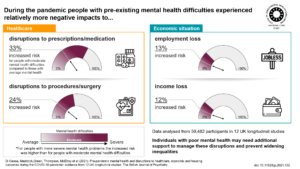Mental health and the pandemic – How has it affected us?
 Before Covid-19, I had recently started a job working as the Generation Scotland Questionnaire Officer, where I was tasked with creating the online questionnaires that we send to old and new Generation Scotland volunteers. I had only just started thinking about what’s important to ask our volunteers when Covid-19 hit. We had to put our planned recruitment of new volunteers on hold.
Before Covid-19, I had recently started a job working as the Generation Scotland Questionnaire Officer, where I was tasked with creating the online questionnaires that we send to old and new Generation Scotland volunteers. I had only just started thinking about what’s important to ask our volunteers when Covid-19 hit. We had to put our planned recruitment of new volunteers on hold.
As a team, we decided we should change our focus to carrying out surveys to understand how people were feeling and coping during the pandemic. Although every one of us has been affected by Covid-19 in some way, it hasn’t affected us all equally. The Generation Scotland team wanted to better understand who was struggling during Covid-19, why they were struggling, and how this changed over time. So, the CovidLife studies were born. It was my job to create the CovidLife questionnaires.
CovidLife launched in April 2020 during the first lockdown. We followed up on our volunteers on two occasions. Our first was in summer 2020, when the restrictions had eased and Covid-19 cases were relatively low. Our second follow-up was in February this year, when we were in another full lockdown.
 Creating and launching CovidLife was an extremely busy time for all of us on the Generation Scotland team. We were developing online questionnaires, gaining approval for each study, testing that the questionnaires worked as we wanted them, recruiting volunteers, and making sure the data was all in order. In amongst all of this, we also ran two other sets of studies to investigate the mental health and wellbeing of adolescents and to better understand the issues faced by rural Scottish communities during Covid-19.
Creating and launching CovidLife was an extremely busy time for all of us on the Generation Scotland team. We were developing online questionnaires, gaining approval for each study, testing that the questionnaires worked as we wanted them, recruiting volunteers, and making sure the data was all in order. In amongst all of this, we also ran two other sets of studies to investigate the mental health and wellbeing of adolescents and to better understand the issues faced by rural Scottish communities during Covid-19.
It was worth the hard work. We received responses from over 25,000 volunteers. This data is now being used by researchers in the Generation Scotland team, as well as researchers from elsewhere in the UK, to better understand the mental health impact of the pandemic. One study looked at who was at risk of depression and anxiety during Covid-19. This study combined the results of two cohort studies, CovidLife and the Avon Longitudinal Study of Parents and Children. Women, younger adults, those living in more deprived areas, and participants with a history of obesity had increased rates of depression and anxiety. You can see more detailed information on that study below.
Mental health before and during the pandemic
One of the benefits of combining the results from multiple studies is that you can see whether similar patterns emerge across a range of studies. If similar patterns do emerge, we can be a little more confident in the results. Generation Scotland is part of the National Core Studies Covid-19 Longitudinal Health and Wellbeing initiative, which was set up to enable different health studies in the UK to work together to better understand the mental health implications of Covid-19.
COVID-19 Longitudinal Health and Wellbeing – National Core Study
 Through this initiative, a recent study combined the results from nearly 60,000 people from 12 different studies, including data from Generation Scotland members who answered the CovidLife questionnaires. This study found that people who had poorer mental health before the pandemic were more likely to experience disruptions to health care, such as cancelled medical procedures, and disruptions to economic activity, including losing their job or loss of income. For more detailed information on the research, visit:
Through this initiative, a recent study combined the results from nearly 60,000 people from 12 different studies, including data from Generation Scotland members who answered the CovidLife questionnaires. This study found that people who had poorer mental health before the pandemic were more likely to experience disruptions to health care, such as cancelled medical procedures, and disruptions to economic activity, including losing their job or loss of income. For more detailed information on the research, visit:
People with previous mental ill health hit harder by pandemic disruption
These studies found what we all suspected – the Covid-19 pandemic was tougher on some more than others. Many more papers will come out of the CovidLife data. Ongoing research using CovidLife data include those investigating who felt lonely during the pandemic, whether people who had Covid-19 have poorer mental health, and how levels of depression and anxiety changed over time as the pandemic progressed. None of this work would have been possible without our volunteers donating their time to our studies. Without them, we’d have no data! It’s a good feeling knowing that the questionnaires that I designed have been used – and will continue to be used – to help understand who needs additional mental health support during and after the Covid-19 pandemic.
(Chloe Fawns-Ritchie)
(Chloe Fawns-Ritchie)
(Graphics: Longitudinal Health and Wellbeing - National Core Studies)




Recent comments